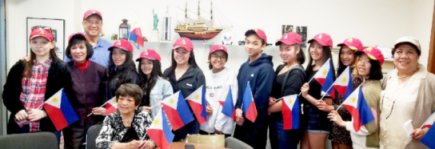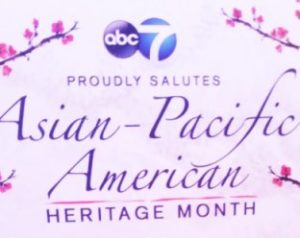Musings of a Filipino-American (1st prize winner essay from Florence Almeda)
I am steeped in sinigang, filled with the sound of jeepneys, and coated with Catholic sayings. I am not afraid of unfertilized duck egg and ninety-five degree weather. I crave the subtle sweetness of ube ice cream, love my barkada, offer mano to my elders, and if you haven’t guessed by now– I am Filipino. When my parents were only 24, they immigrated from the Philippines to Chicago in hopes of raising their children with bright futures. Despite the fact that we now live over 8,000 miles from the Philippines, my parents have made an effort to bring up my sisters and me as Filipino as possible– and I have not only appreciated this greatly, but have drawn my own conclusions about these values that I have grown up with. While I believe that certain practices brought over from the Philippines, such as religion and family, have benefitted Filipinos in the States, it is important to recognize the more detrimental ones, such as the misconception that white skin is more beautiful than dark skin, in order to fully understand our identities as Filipino-Americans.
Christianity, the most prominent and unifying practice in the Philippines, has benefitted Filipinos in the States greatly. The Philippines is a Christian country in Asia, with 86.8 million Filipinos, or 93 percent of the population practicing Christianity. Visiting Manila, it is almost shocking to see the number of churches everywhere I turn–even in the mall, there are masses being held. For this reason, religion is ingrained into the everyday life of many Filipinos in both the Philippines and the States. In the States, I believe that religion gives Filipinos a sense of community. No matter where we are in the world, prayer remains the same, so for many, attending mass and hearing familiar words or celebrating holidays like Easter or Christmas can help one feel at home in a foreign country. It is common that the church can be used as a place where Filipinos meet other Filipinos–furthering the idea that religion benefits Filipinos in the States.
I believe that having strong family ties is an important practice that should be perpetuated as well. When I was young, my dad instilled in me the idea that “family comes first.” I was taught never to talk back to my parents and always to show my grandparents respect. As a child, I went to the store together with my entire family. Although I often resented the feeling of spending most of my time with my family, I am incredibly thankful for what my parents have given me. My family is my foundation–they are the shoulders I cry on and the guidance I need when I am lost. In addition to this, I believe that treating elders with respect is one aspect of family that could benefit many Americans as well. In American society, it is typical to move out of the house at a young age or move the parents to an elderly home when they are unable to take care of themselves. In the Philippines, this is unheard of. I believe that since parents are the ones who took care of the children when they were young, it only makes sense that children do the same to their parents.
Despite these practices and many others that benefit Filipinos in the States, there is one idea from the Philippines that stands out to me as extremely detrimental: the notion that white skin is more beautiful than dark skin. It was only during my last visit to the Philippines when I realized how embedded this idea was in Philippine society. On the drive from the airport to my grandparents’ house, I saw at least a dozen billboards for skin whitening products. From pills to creams to surgical operations, these means of making skin whiter seem not only desperate but also dangerous. Later that week, while I was watching a Filipino movie, I noticed that nearly all of the actors appeared to have light skin. As this was an issue that I had struggled with myself in the States, the fact that it was so problematic in the Philippines not only frightened me, but also helped me to take off my rose-colored glasses.
For many Filipino-Americans, it is diffcult to reconcile our Filipino halves with our American halves. I have grown up with this ever-present faith, the sense of family, the respect for elders, and yet I still question–Am I more Filipino, or am I more American? While this is a question I continue to struggle with, I believe that for all Filipinos in the United States, talking about the different parts of what it means to be Filipino– the good, the bad and the ugly– will help us to create an identity that is both unique and beautiful.

Pictured above with the contest committee(Chairperson : Josefina P. Abaya – Wee Sit; Co-chairperson : Fraternidad T. Magdongon; Members : Jean Paredes, Tony Silvano, Susan Silvano) are the 10 essayists: Angela Mihma Achanzar(3rd prize winner : $200), Florence Almeda(1st prize winner: $300), Kailanie Ilagan, Marissa Laqui, Kayla Tejero(5th prize winner : $100), Michelle Torralba(4th prize winner : $150), Juliana Vargas, Reijhay Vargas(2nd prize winner : $250), April Villalon, May Villalon.
The cash prizes of the contest winners were provided by some benevolent donors: Tito M. Wee Sit Memorial Fund ($300), U.P. Alumni Nursing Association of the Midwest ($250), Tony Lin-Owner, Yummy Buffet ($200), PIWC Board of Trustees ($150), Maria Javate Smith-Mrs. Kasarinlan 2004 ($100). Likewise, Tony and Susan Silvano donated the $20 bonus for each essayist, while Angelina Francisco was the benefactor of the medals of the contest winners.
 VIA Times – June 2018 Issue Vital News, Vibrant VIews for Asian Americans in Chicago & Midwest
VIA Times – June 2018 Issue Vital News, Vibrant VIews for Asian Americans in Chicago & Midwest




